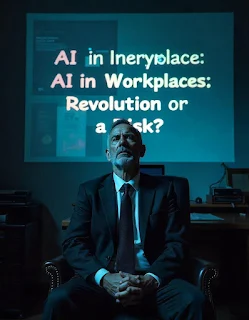AI in Workplaces: A Revolution or a Risk?
Artificial Intelligence (AI) is transforming workplaces at an unprecedented pace. From AI-powered chatbots to automation tools, businesses are leveraging AI to streamline operations, enhance productivity, and improve decision-making. However, this rapid integration also raises concerns about bias, job displacement, and security risks.
Is AI truly a workplace revolution, or does it pose significant risks to employees and businesses? Let’s explore its benefits, challenges, and future implications.
How AI is Revolutionizing Workplaces
AI is no longer just a futuristic concept—it has become a fundamental part of modern business operations. Companies across various industries are using AI to:
1. Boost Productivity & Efficiency
AI enables employees to focus on high-value tasks by automating repetitive work, reducing manual effort, and improving efficiency.
✅ Automates Routine Tasks – AI handles repetitive processes, allowing employees to focus on more strategic work.
✅ Enhances Decision-Making – AI analyzes large datasets to provide valuable insights for smarter business strategies.
✅ Speeds Up Workflows – AI-driven tools help businesses operate more efficiently with faster data processing and automation.
2. Enhancing Customer Experience
AI-powered chatbots and virtual assistants improve customer satisfaction by offering fast, personalized support. AI can analyze user behavior, predict customer needs, and adapt interactions accordingly.
✅ 24/7 Support – AI chatbots ensure round-the-clock customer service without human intervention.
✅ Personalized Recommendations – AI analyzes user data to tailor customer experiences.
✅ Quick Query Resolution – AI reduces waiting times and enhances response accuracy.
3. Improving Workplace Collaboration
AI-driven tools such as Microsoft Copilot, ChatGPT, and Gemini assist in content creation, communication, and collaboration. AI also enhances virtual meetings and remote teamwork, making global teams more efficient.
✅ AI-Assisted Writing – AI helps create content quickly and efficiently.
✅ Smart Meeting Assistants – AI can summarize discussions and transcribe meetings.
✅ Better Workflow Automation – AI streamlines task management and scheduling, improving overall productivity.
The Risks of AI in Workplaces
While AI offers numerous advantages, it also presents significant risks that businesses must carefully address.
1. Job Displacement & Workforce Impact
Automation threatens jobs, particularly those involving repetitive tasks. While AI creates new opportunities, it also requires employees to upskill and adapt.
⚠️ AI replacing manual jobs may impact employment rates.
⚠️ Workers must learn AI-driven workflows to stay relevant.
2. Bias & Ethical Concerns
AI models are trained on historical data, which can lead to biased decision-making. If not properly monitored, AI can reinforce workplace inequalities, result in unfair promotions, and contribute to discrimination in customer interactions.
⚠️ AI can inherit human biases if not regulated.
⚠️ Ethical AI policies are necessary to ensure fairness.
3. Security & Data Privacy Issues
AI relies on large datasets, making companies vulnerable to cyber threats and data breaches. Without proper security measures, AI systems could expose sensitive business and customer information.
⚠️ AI-powered cyberattacks are increasing.
⚠️ Strict data protection policies are essential to safeguard information.
The Future of AI in Workplaces: Striking the Right Balance
AI is here to stay, but its future impact depends on how businesses adopt and regulate it. Rather than replacing human workers, AI should be used to enhance human intelligence and support employees.
How to Ensure Responsible AI Adoption
✅ Invest in Employee Training – Equip workers with AI skills to maximize efficiency.
✅ Implement Ethical AI Guidelines – Prevent bias and discrimination.
✅ Strengthen Data Security – Protect sensitive business and customer information.
✅ Use AI as a Growth Tool – AI should assist, not replace, human roles.
Conclusion: A Workplace Revolution with Caution
AI is undeniably reshaping workplaces, boosting productivity, and streamlining operations. However, responsible adoption is crucial to mitigating risks such as job displacement, security vulnerabilities, and bias.
So, is AI a revolution or a risk? The answer depends on how businesses use it—as a tool to enhance human work rather than replace it.





Comments
Post a Comment